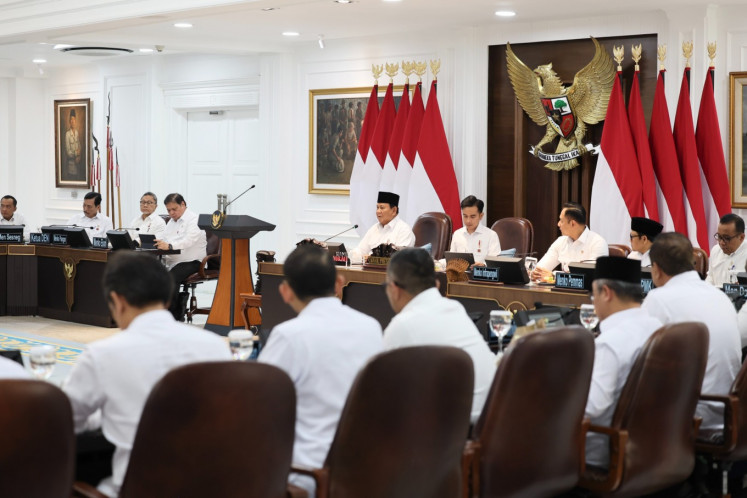Popular Reads
Top Results
Can't find what you're looking for?
View all search resultsPopular Reads
Top Results
Can't find what you're looking for?
View all search resultsVikram Hazra: Ancient spirituals, modern sound
(JP/Aruna Harjani)The Indian man in navy blue suit holding a contrasting white electric guitar sat on stage recently at the Blitz Theater in Central Jakartaâs Grand Indonesia mall
Change text size
Gift Premium Articles
to Anyone
(JP/Aruna Harjani)
The Indian man in navy blue suit holding a contrasting white electric guitar sat on stage recently at the Blitz Theater in Central Jakarta's Grand Indonesia mall.
From his synthesis of musical styles, use of various languages and spiritual content, musician Vikram Hazra strives to express harmony. With his fingers dancing across the frets, Hazra opened his recent show with a soothing melody containing a prayer for the Hindu god Ganesha.
'My goal is to play vibrant, energetic, uplifting music that gives out vibrations and frequencies that help calm the mind' Hazra said.
Hazra crafts specific tones and sounds that induce a sense of calmness even if the song is lively. 'I found out that the Sanskrit words used in these ancient songs have a soothing effect on the human mind and the nervous system.' said the 42-year-old singer.
Hazra has been studying and performing ancient Sanskrit chants (bhajans), traditional folk songs and devotional music for nearly 20 years. 'In India these kinds of songs are often unfairly relegated solely to religious functions, to old people or to depressed people.'
Unlike most traditional Indian performers, Hazra shares the stage with a jazz/rock lead guitarist and a tabla player/electronic percussionist.
In his show, Hazra moved on to the song 'Rise and Pray', which features a mixture of English and African (Xhosa) lyrics, and followed with a Punjabi song called 'Tum siyon jori' written by the guru Granth Saheb. The lyrics of his next song, 'Hari Bol', were in five languages ' Bengali, Hindi, Gujarati, Rajasthani and English.
Then he sang 'Nothing Less than Everything' by Steven Walters in English and Sanskrit. He then surprised the public by singing 'Amazing Grace', the well-known American spiritual song. When he felt the audience reaching a height of calmness, he then played the flute and sang 'Narayana Hari Om/ Back to You' by Divya Prabha.
His visit to Jakarta was as an emissary of the Art of Living (AOL) Foundation, a global spiritualist organization of which he has been international program director since 1996. His concert, he said, was a 'way to spread more love and peace in the world'.
Hazra has realized that traditional, meaningful songs blend well with modern elements like rock and jazz. By revamping ancient music for the modern ear, he has helped bring the sacred to young people from cultures the world over. 'I want to present Sanskrit chants in a contemporary manner so that my generation or younger audiences can relate to them,' Hazra said.
'For me it was a logical choice because of the kinds of music I listen to. I love jazz, blues and Western music and this is the kind of music the younger generation also loves.'
Asked if he ever tried bringing his music to Bollywood, Hazra quipped: 'When Bollywood stars need to escape from the stress of their public life, they actually come to my concerts to sit quietly and listen to my music. They in fact get their peace of mind from my kind of songs.'
The funds raised from Hazra's concert for AOL are used to support the foundation's many international projects for under-privileged communities, addressing education, clean water and organic farming.
Hazra has performed in over 40 countries all over the world. He has released 11 albums, some of them featuring original compositions. Previously, he was a music critic with his own review columns in leading newspapers.
He is a big fan of avant-garde modern jazz, played by artists such as guitarists Bill Frisell and Allan Holdsworth and trumpet players like Nils Petter Molvaer and Arve Henriksen.
He grew up in Ahmedabad in Gujarat, India, in an academically cultured Bengali family exposed to music, books, art and culture. He was an avid reader, often taking down 200 pages a day and sometimes 600 pages on weekends. Besides books, music became an integral part of his life.
'I knew I wanted to be a musician, not necessarily a professional one but at least a competent guitarist someday.' He never imagined he'd end up singing Sanskrit chants, but joining the Art of Living turned him on to it.
He set out on his path of musical diversity by learning different dialects from the provinces in India. There are 2,500 dialects in India, some of which have been lost or forgotten. He began singing songs in unspoken dialects, which at times surprised people living in that province, as they themselves had never heard of the song.
In international shows, Hazra also incorporates songs and musical elements from the host country. 'I found that everybody is saying the same thing ' we love music, we love peace, good health and happiness,' he said.
'I have played with Japanese, Russian, Mongolian, American and African musicians to name but a few. Each of them has shared music from their culture, in the same tune and with the same vibes as mine.'
Hazra aims to raise the appreciation of ancient Sanskrit chants to the status of an independent
art form, 'to the extent that someday people might be hard-pressed on a Saturday night to choose whether to watch a movie, go clubbing or attend a Bhajan concert,' he said.










